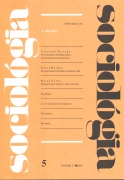Bezpečnosť na prahu 21. storočia
Security at the Beginning of the 21st Century
Author(s): Peter BartákSubject(s): Social Sciences
Published by: SAV - Slovenská akadémia vied - Sociologický ústav
Keywords: Security; perception; evaluation
Summary/Abstract: Security at the Beginning of the 21st century. This study deals with current problems concerning the perception and evaluation of security in the 1980s (during the cold war), during the 1990s and at the beginning of the 21st century. The content, extent and perception of security have changed in the last 20 years. Most importantly, the biggest threats to the security from cold - war times have been eliminated or minimalised. On the other hand, there are new threats, which are mainly internal and non-military (ethnic, environmental, health, crime). Due to these changes, which involves security on personal as well as national and even global levels, the prevailing notion is that the amount of security is not and will not be higher than it used to be during the cold war. Today, we can find at least two different views on security. Some experts conceive it as a (usually defined) state of a concrete social organism, others prefer to comprehend security as an activity, or reaction to a stimulus (threat). This stimulus can be considered either exclusively external and violent (especially military) or can include internal and non-military. The broader the sense of the security threats, the lower the estimation of the level of security. Too broad a conception (quasi-universal) of security thus carries a range of perils and inaccuracies. Attributes ascribed to personal security (e.g. life, health, property…) differ from those related to state or national security (e.g. sovereignty, integration, national interests, constitutional order…). Other attributes are connected with international issues (e.g. UN Charter, human rights and liberties, democracy, international law…) At present there is a lack of definite specification and of united usage on the security of social organisms and subjects. The level of security should not be evaluated solely according to the types, amount or intensity of the (security) threats. Considering the level of the risks resulting from these threats is of the same importance. These risks can and should be regulated by competent subjects, primarily by the state. The majority of current dangers are not fatal, which is why their consequences can be reduced or eliminated by correctly assessing the risks. Avowedly, the level of security can decrease. Especially if leading politicians do not accept or do not cope with the peace alternative of the globalisation process or if they do not prevent the militarization of products of current scientific and technological development. The most important challenges are raids into space and genetic modification. In conclusion, we appeal for the need to prepare people, particularly safety experts, politicians, and soldiers, but also scientists, teachers, and journalists to confront the safety challenges of the 21st century. In the Slovak context, this chiefly means including new topics, new subjects and new departments of study in public schools as well as the creation of a more extensive.
Journal: Sociológia - Slovak Sociological Review
- Issue Year: 2003
- Issue No: 5
- Page Range: 453-464
- Page Count: 12
- Language: Slovak

